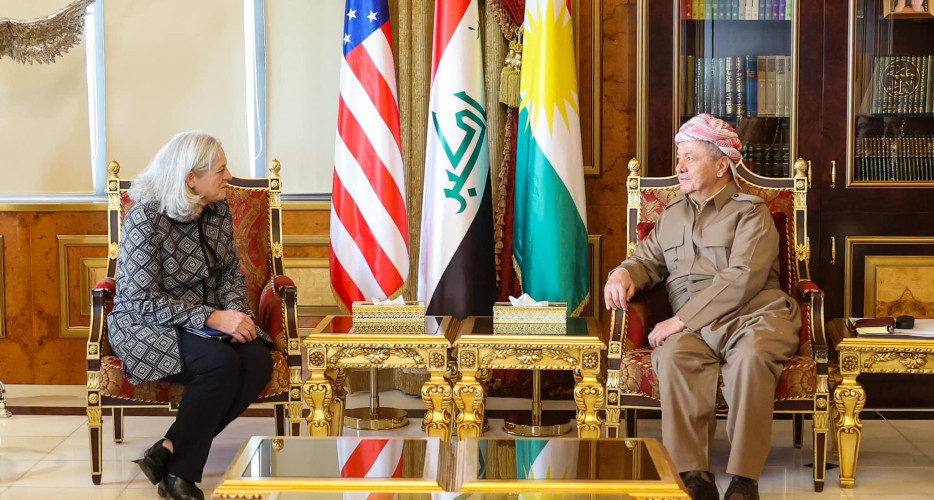
Peregraf
Massoud Barzani, President of the Kurdistan Democratic Party (KDP), has announced the establishment of a team tasked with discussing the formation of the forthcoming Kurdistan Regional Government (KRG) Cabinet and its agenda. He emphasized that the KDP does not hold a veto over any political party.
Today, the KDP leader engaged in discussions with US Ambassador to Iraq, Alina Romanowski, regarding the formation of the new government in the Kurdistan Region and the ongoing negotiations among political factions.
According to the statement released by the Barzani Headquarter, The US ambassador extended her congratulations to Massoud Barzani following the success of the parliamentary elections held on October 20. She highlighted that the elections took place in a democratic and peaceful environment, despite the complex circumstances in the Middle East, showcasing a commendable image of the Kurdistan Region.
Barzani expressed his gratitude to the international community and the Iraqi Independent High Election Commission (IHEC) for their contributions to the successful conduct of the Kurdistan parliamentary elections, notwithstanding some technical challenges.
The formation of the KRG cabinet has always been a complex and often contentious process, primarily involving the two major political parties: the KDP and the Patriotic Union of Kurdistan (PUK). The KDP and PUK have been the dominant political forces in the Kurdistan Region of Iraq since its establishment. Historically, these parties have had a power-sharing arrangement, often leading to coalition governments. However, their relationship has been marked by periods of cooperation and rivalry, influenced by their differing political ideologies and regional support bases.
The 2024 Kurdistan Parliamentary elections, for instance, highlighted the ongoing competition between the KDP and PUK. Despite the KDP securing a significant number of votes, the PUK also made substantial gains, leading to a complex negotiation process for cabinet positions.
Masrour Barzani, the current Prime Minister of the KRG, has been a central figure in the KDP and has played a significant role in shaping the political landscape of the Kurdistan Region. His leadership has been criticized for consolidating power within the KDP, leading to accusations of monopolizing the government and marginalizing other political parties, particularly the PUK. Critics argue that Masrour Barzani's administration has prioritized the interests of the KDP over those of the broader Kurdish population. This concentration of power has raised concerns about the erosion of democratic principles and the potential for authoritarian governance.
In the Kurdistan Region, the "Green Zone" often refers to areas controlled by the PUK, while the "Yellow Zone" refers to areas controlled by the (KDP. Masrour Barzani, as the Prime Minister of the Kurdistan Regional Government (KRG), has been involved in various projects across the region. Additionally, he has laid the foundation for infrastructure projects. However, there have been tensions between the PUK and KDP regarding the allocation of resources and development projects. The PUK has accused the KRG of favoring Erbil and providing fewer funds for Sulaymaniyah, which is under PUK control. This has led to criticisms that Barzani's administration may be neglecting projects in the "Green Zone" or areas controlled by the PUK.
In reaction to the current KRG cabinet led by the PDK, Bafel Talabani, the leader of the PUK, has articulated a clear strategy for the formation of the new KRG cabinet. During a meeting with the US Ambassador to Iraq, Alina Romanowski yesterday, Talabani emphasized that the PUK is advancing towards establishing a government guided by a new strategy, aiming to avoid the pitfalls of past dictatorial governance. He stated, "The era of dictatorship has ended, and it is imperative to establish a responsible national government."
Talabani further highlighted the PUK's objective to create a national government that is accountable to its citizens, equitable, and serves all cities without discrimination. He underscored that the previous misuse of government institutions for party and personal gain is a thing of the past, and the government must no longer function solely to benefit a specific political party.